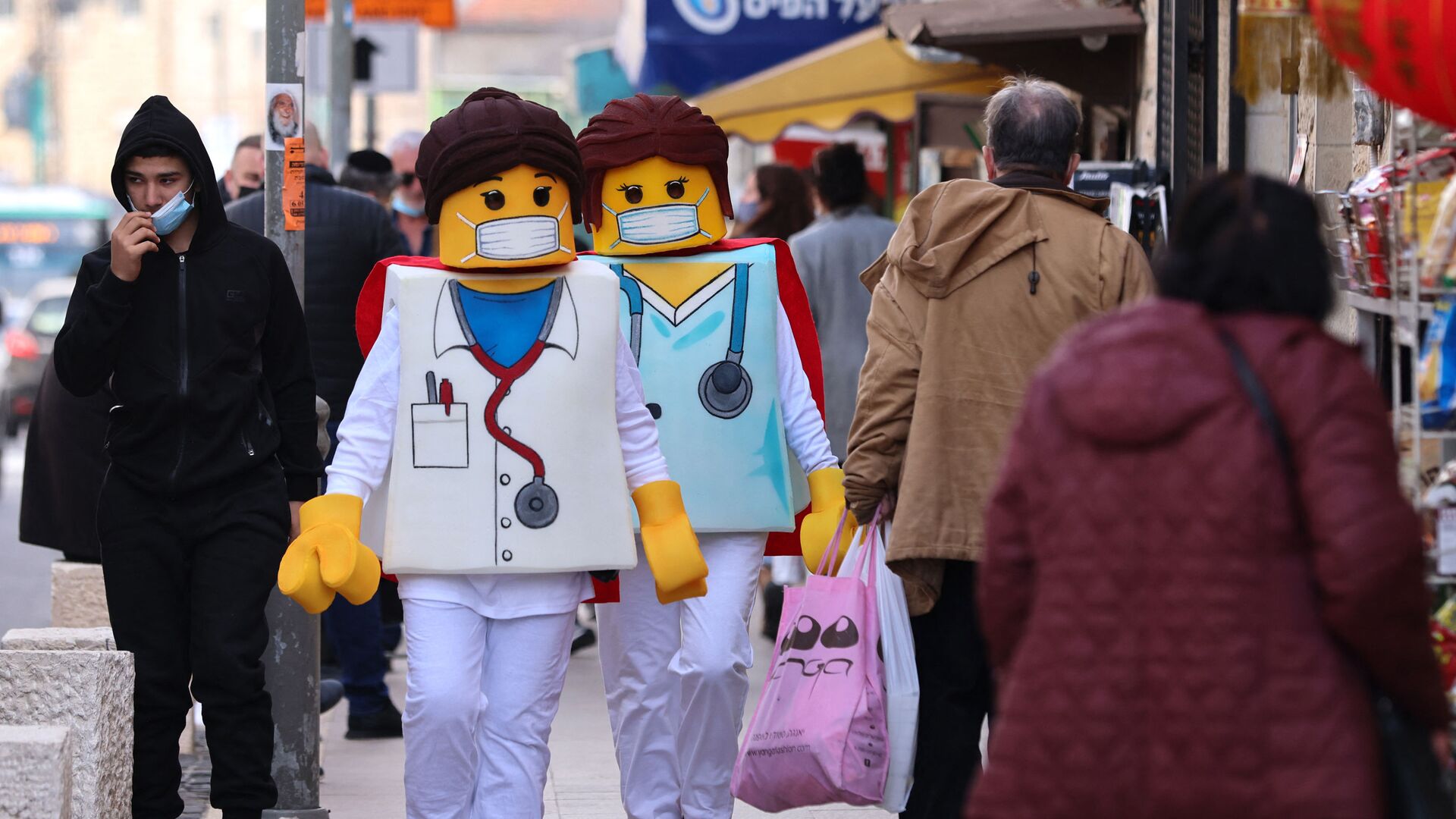https://sputnikglobe.com/20220413/will-israel-avert-sixth-covid-19-wave-as-passover-festivities-loom-1094726362.html
Will Israel Avert Sixth COVID-19 Wave as Passover Festivities Loom?
Will Israel Avert Sixth COVID-19 Wave as Passover Festivities Loom?
Sputnik International
COVID-19 has not been in the media spotlight in Israel of late, as the news has been dominated by Russia's special military operation in Ukraine, a wave of... 13.04.2022, Sputnik International
2022-04-13T08:44+0000
2022-04-13T08:44+0000
2023-01-15T17:25+0000
middle east
coronavirus
covid-19
israel
https://cdn1.img.sputnikglobe.com/img/07e5/02/1a/1082193669_0:0:3072:1728_1920x0_80_0_0_6e2cb15093dd2590eb278e6937415484.jpg
Yet, the situation may deteriorate as the nation approaches Passover, a celebration that traditionally stipulates family gatherings, says Israeli professor, Cyrille Cohen.On Tuesday, the Jewish state registered more than 6,600 new coronavirus cases, pushing the overall number to 45,000 people. Some 222 of them are in critical condition. But the upcoming holidays that bring families and friends together might cause these numbers to spike.Still a Manageable Situation?COVID-19 has been pushed to the sidelines and Professor Cyrille Cohen, a member of the advisory committee for clinical trials of the coronavirus vaccine at Israel's Ministry of Health, says the situation is under control "for now"."The situation is not totally okay but manageable", he said over the phone.On Friday, Jews around the world will celebrate Passover. According to a recent poll conducted by the Israel Democracy Institute, 96 percent of all Israelis are planning to host family and friends for a festive feast marking the beginning of the Jewish holiday. And if this is the case, Cohen admits the country might see a rise in numbers shortly after the celebrations are over.Lessons Learned?After going through five waves of COVID-19, with the most recent occurring in January, it appears that Israelis are not frightened by another eruption of the disease. Cohen says his country has learned to cope with the pandemic and adapt to today's changing reality.Israel still has some restrictions in place like mandatory masks and a ban on large gatherings in closed spaces. It continues to offer the coronavirus vaccines and a number of treatments meant to mitigate severe cases of coronavirus. But in some cases, the Jewish state, says the professor, hasn't learned from the mistakes of the past.One such area is the healthcare system. During the fifth wave of the pandemic thousands of Israeli doctors and nurses fell ill. Those who remained were forced to work unreasonable hours to compensate for the lack of staff, and the government was struggling to offer them a helping hand.Assistance was also needed in equipment and funding, and as numbers in January continued to climb Israel found itself in a position where it was unable to meet the growing demand for hospital beds or ECMO machines.Since the outbreak of the pandemic in Israel in February 2020, the country has been trying out various approaches concerning children's education amid COVID-19.Initially, all educational institutions were closed down. Then it was decided to allow children to study via Zoom, something that proved to have negative effects on their physical and psychological well-being. Later on, Israeli kids were allowed to attend classes in capsules, and now most limitations have been removed, although students are still required to test themselves twice a week before coming to school.The change in approaches, the inconsistency, and the fact that many children ended up getting the virus, prompted an outcry from many parents, politicians, and experts. And Cohen says he was no exception.
israel
Sputnik International
feedback@sputniknews.com
+74956456601
MIA „Rosiya Segodnya“
2022
News
en_EN
Sputnik International
feedback@sputniknews.com
+74956456601
MIA „Rosiya Segodnya“
Sputnik International
feedback@sputniknews.com
+74956456601
MIA „Rosiya Segodnya“
middle east, coronavirus, covid-19, israel
middle east, coronavirus, covid-19, israel
Will Israel Avert Sixth COVID-19 Wave as Passover Festivities Loom?
08:44 GMT 13.04.2022 (Updated: 17:25 GMT 15.01.2023) COVID-19 has not been in the media spotlight in Israel of late, as the news has been dominated by Russia's special military operation in Ukraine, a wave of terror attacks, and political turmoil in the Israeli government.
Yet, the situation may deteriorate as the nation approaches Passover, a celebration that traditionally stipulates family gatherings, says Israeli professor, Cyrille Cohen.
On Tuesday, the Jewish state registered more than 6,600 new coronavirus cases, pushing the overall number to 45,000 people. Some 222 of them are in critical condition. But the upcoming holidays that bring families and friends together might cause these numbers to spike.
Still a Manageable Situation?
COVID-19 has been pushed to the sidelines and Professor Cyrille Cohen, a member of the advisory committee for clinical trials of the coronavirus vaccine at Israel's Ministry of Health, says the situation is under control "for now".
"The situation is not totally okay but manageable", he said over the phone.
"A month ago, during the Purim holiday, we saw an increase in daily COVID-19 patients so we postponed the decision to lift mask regulations. And I think things are now under control".
On Friday, Jews around the world will celebrate Passover. According to a recent poll conducted by the Israel Democracy Institute, 96 percent of all Israelis are planning to host family and friends for a festive feast marking the
beginning of the Jewish holiday. And if this is the case, Cohen admits the country might see a rise in numbers shortly after the celebrations are over.
After going through five waves of COVID-19, with the most recent occurring in January, it appears that Israelis are not frightened by another eruption of the disease. Cohen says his country has learned to cope with the pandemic and adapt to today's changing reality.
Israel still has some restrictions in place like mandatory masks and a ban on large gatherings in closed spaces. It continues to offer the coronavirus vaccines and a number of treatments meant to mitigate severe cases of coronavirus. But in some cases, the Jewish state, says the professor,
hasn't learned from the mistakes of the past.One such area is the healthcare system. During the fifth wave of the pandemic thousands of Israeli doctors and nurses fell ill. Those who remained were forced to work unreasonable hours to compensate for the lack of staff, and the government was struggling to offer them a helping hand.
Assistance was also needed in equipment and funding, and as numbers in January continued to climb Israel found itself in a position where it was unable to meet the growing demand for hospital beds or ECMO machines.
"We need to put more effort into the healthcare system. We need to pump more money and resources to provide hospitals with what they need", said Cohen.
"But the medical sphere is not the only issue. Another weakness of ours is the way we coped with COVID-19 in educational institutions, and we need to make sure that we know to tackle it in the future", he added.
Since the outbreak of the pandemic in Israel in February 2020, the country has been trying out various approaches concerning children's education amid COVID-19.
Initially, all educational institutions were closed down. Then it was decided to allow children to study via Zoom, something that proved to have negative effects on their physical and psychological well-being. Later on, Israeli kids were allowed to attend classes in capsules, and now most limitations have been removed, although students are still required to test themselves twice a week before coming to school.
The change in approaches, the inconsistency, and the fact that many children ended up getting the virus, prompted an outcry from many parents, politicians, and experts. And Cohen says he was no exception.
"Our children have paid the price for relying on Zoom so we need to be smart the next time there is an outbreak. Maybe we need to install air purifiers in schools or come up with another strategy but one thing is for sure we need to adjust", he reasoned.





